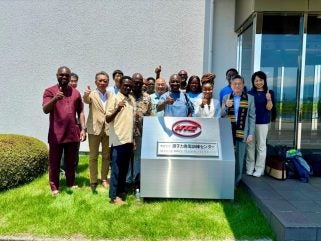
The Ghana Atomic Energy Commission (GAEC), with the support of Ghana’s Mission in Tokyo, has initiated technical cooperation with the International Cooperation Centre of the Japan Atomic Industrial Forum (JAIF). The initiative is in line with the Ghana Nuclear Programme Infrastructure Development agenda and aims to facilitate knowledge transfer to develop the competencies of Ghanaian professionals in nuclear science and technology. Ghana’s nuclear energy programme is intended to boost industrialisation, digitalisation and the overall developmental agenda.
The cooperation is intended to provide “cooperation for nuclear energy development effectively and efficiently and to serve as a contact window and facilitator towards promoting concrete cooperative activities such as the dispatching of nuclear experts, inviting trainees, hosting seminars” etc both within and outside the country of Japan.”
A Ghanaian delegation, headed by Ernest Owusu-Afari, a board member of the Nuclear Power Institute, recently visited Japan to study the advanced safety measures of nuclear power plants. The team comprised 10 people from technical agencies, public and private sectors and the media. The visit aimed at building the capacities of the participants on advanced nuclear safety and the technology of NPPs and the Japanese nuclear power programme.
The delegation visited a number of nuclear facilities including the Tsuruga NPP, the Japan Atomic Power Company’s Mihama Nuclear Emergency Assistance Centre (M-NEACE), the Nuclear Power Training Centre (NTC), the Fukui Nuclear Centre at Home, the JGC/IHI Holding nuclear collaborative effort, and the Japan Atomic Energy Agency (JAEA). The visit included discussions with experts including Hiroki Takimoto and Toshihiro Yamakawa (both General Managers of the JAIF International Cooperation Centre), Kurauchi Hironobu (Deputy Superintendent at the Tsuruga NPP), among others.
Owusu-Afari noted, at the end of the visit: “Nuclear energy continues to be utilised worldwide — by the developed and developing world alike. Ghana has no reason to be fearful of it. Nuclear power is an indispensable alternative source of energy — especially in this era where climate change remains one of the world’s greatest concerns. We should have the self-belief that just as nations of the world have employed nuclear power for their national growths, so can we.”
He added: “There is a lot Ghana can learn from Japan on this front. Our nuclear journey must not race ahead of the Ghanaian society. The Ghanaian populace must be brought along on this journey. They must be made to understand in full the opportunities and risks and how those risks will be mitigated…. The potential of nuclear energy is enormous. This energy source characteristically has such an immense multiplier effect—it has the capacity of speeding both our industrialisation and digitalisation drive, creating jobs, and overall, driving our development agenda.”
In the past three years, technical cooperation with Japan has seen more than 450 Ghanaian professionals trained in several virtual workshops on various thematic areas related to nuclear power. These comprised industry experts, technical organisations, private sector players, the media, and other interested parties.






